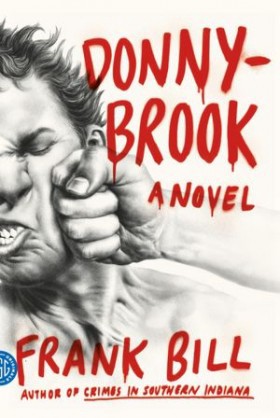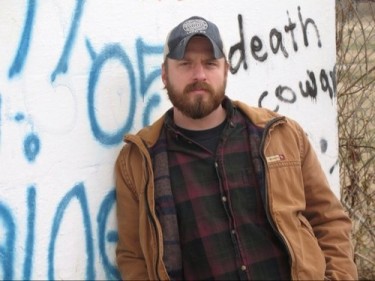"Too Much Like Reality": Writer Frank Bill On Violence, Meth And Work
by Rob Brunner

Have you ever gotten punched in the face? I have not. Nor have I ever punched anyone in the face, or seriously wanted to punch anyone in the face, or even been that close to many faces that were getting punched. The whole enterprise of face punching strikes me as both dumb and, if I’m honest, pretty terrifying. So I didn’t expect to spend much time with Frank Bill’s blood-sodden bone-crunch of a debut novel, Donnybrook (out March 5), one of the most unrepentantly, gleefully violent books I’ve ever come across. It’s about a bunch of loathsome redneck thugs who, while feuding over a stolen batch of meth, rendezvous at a backwoods bare-knuckle-fighting tournament to pummel each other into a heap of steaming mush. While that sounds like something no half-rational adult would ever want to slog through, it’s actually riveting stuff, mostly because Bill’s writing bleeds style and energy: there’s a kind of poetry in all the smashed skulls. “Wet dripped from the parted cartilage of his nose,” Bill writes. “Blotted and crusted onto flared lips. Ran down his butt-crack chin. Fertilized his crop of curled chest hair. A few teeth stuck to and stained his pink Izod shirt. Eldon’s tough talk had disappeared when the swelled slits of his eyes blinked back open.” And so on.
It turns out Bill is a forklift operator at a southern Indiana paint-additives plant, where he’s worked for almost 19 years. Donnybrook is his second book (after the well-received 2011 story collection Crimes in Southern Indiana). He gets up at 3:30 every morning to write as much as he can before heading to work around 7. In person, he’s actually a nice guy. Less so when he’s at the computer. “I’m not gonna ever write puppy dogs and ponies and the Care Bears,” he says. I called him one recent evening after his shift at the factory. Here’s what he had to say.
Rob Brunner: So Donnybrook is astonishingly violent. Why are you so interested in that kind of pain and anger and blood-splattering and cartilage crunching?
Frank Bill: Violence doesn’t bother me. I mean, grew up around hunting and skinning animals. That’s a violent ritual to eat food. Then there were the stories I grew up with about [someone a family member knew] who was a very violent man. He abused [various people] for about six years. I grew up around those stories — conversations about him coming home from work and shooting a dog or beating [someone] half the night, you know, not letting the kids eat anything. The other thing is just, when I was on [the night shift] I would read the paper every night. I was kind of like, man, look at this stuff. And then movies I like, things like Quentin Tarantino, they’re violent, but there’s a good story there. The old Clint Eastwood movies. Not that I’m a violent person, but those are the kinds of things that interest me. When I write something I want to put you in the scene. I want you to feel it, taste it and see it, and maybe even be repulsed by it.
The fighting in Donnybrook felt so much rougher to me than what you see in movies. Do you think people react differently to the violence in your writing than to movie and TV violence, which we’re maybe more numb to?
Probably people that didn’t like my books. [Laughs] But I understand what they’re saying. They’re like, “This is too much like reality.” Especially if you write about meth or the influence of drugs or alcohol on people. Well, then don’t read it! When I write, I don’t necessarily sit down and think about violence. I think a lot about language and character and movement. I wish sometimes people would pay more attention to how I write rather than what I write about. It’s not easy to sit there and come up with things. My stuff’s just not for everybody. I understand that.
I have to say, you seem like a pretty mellow dude. Are you secretly, like, a seething monster underneath the nice-guy exterior?
I mean, I have a temper, but I’m not really an angry person. Sometimes I sit down and write and I can release my frustration on the page. I am pretty laid back, but it’s kinda like, if push comes to shove then I’m pushing back, you know what I mean?
When was the last time you were in a fight?
I’ve never really actually been in a fight. I’ve never been in, like, a great big free-for-all or anything.
What about just a punch thrown at a bar or something?
Gosh, it’s probably been a long time ago. These guys, we used to [study martial arts] together and we used to go barhopping all the time. That’s probably back in 94, 95. You know how long a fight actually lasts is basically two or three movements: somebody reacts, the other person reacts, and it’s pretty much decided in that quick of a scenario. It’s just one of those things where somebody knows when to back off. If somebody makes you hurt, you’re not going to keep trying to do something.
What kind of research did you do for this book? Are there actual underground fighting events like the ones you describe?
There was a guy that studied [martial arts] with us, and I don’t know how much truth there is to this, but he would always talk about these underground fights. Of course, we never went to any of them, but that was something that always stuck in my head. The only research I did for this book — other than when I was younger and tried crystal meth — was I interviewed an ex-meth addict to get a [meth] recipe. He explained to me how they cooked it.
Wait, you tried crystal meth?
A guy I ran around with when I was in high school in the mid-90s used to get crystal meth in the mail. He’s dead now. He didn’t die from drugs or anything. He had a car wreck. We spent one entire week doing it. That’s the only time I’ve ever done it.
Did you like it?
Yeah, I can see how you can get addicted to it. But I didn’t get addicted to it. Every cigarette I lit it was like, man, this is the best damn cigarette I’ve ever had. It had that euphoria. It got your feel-goods going in your brain. It made you feel like Superman: everything you did was good. If I was gonna hug my girlfriend, it was probably the best hug I could get. My buddy and I went back to my house to go to sleep. I tried to lie in my bed for about and hour. I got up, and he was giggling. He was like, “You can’t sleep, can you?” I’m like, “no, I can’t sleep.” And he’s like, “Your heart feels like it’s gonna explode, don’t it?” I said, “Yeah.” He’s like, “Yeah, mine too!” God, it was horrible. I couldn’t sleep that first night. I’m like, “jeez, I don’t want to do this shit again.” It was a pretty wild week.
There’s obviously a lot of talk right now about violence in entertainment and to what extent it might be contributing to various horrific incidents. What do you make of that debate, and do you think there’s anything irresponsible about the kind of stories you’re telling?
I don’t see it that way. The more I look at the violence that happens, I’m kind of like, yeah, these kids watched a movie and you can blame it on that movie, but there’s something wrong in their perception of reality. There was already something wrong with that individual. They didn’t need to have a gun to begin with. I’ll probably get a lot of shit for saying this, but I’ve never been a big automatic-weapons fan. I grew up with a shotgun and a .22. It was for hunting. I have two handguns for protection. I’ve been around guns, and I’ve been picked on at school, too. But I’ve never wanted to just go out and murder people, you know? You’ve gotta know right from wrong. I don’t really have all the answers, but I don’t see myself as somebody that you point the finger at because [my work is] so violent. There’s a lot worse things than me, you know?

So you live in Corydon, Indiana. What’s that like?
I’ve always lived in Corydon. I was born and raised here in southern Indiana. It’s a small town. I grew up reading comic books, hanging out with my grandparents and my dad. My dad was always going hunting and helping my grandfather cut wood. They lived on a farm and didn’t have electric heat. My dad and grandfather hunted a lot. They hunted everything from squirrel to deer to rabbit. Of course my grandpa was also an avid coon hunter. I was a big rabbit and squirrel hunter.
What were you like in high school?
People always laugh at this, but I was kind of clean cut. I played basketball in elementary school, and then somewhere between fifth and sixth grade I started studying martial arts. I studied that until I was probably 16 or 17, at that age when kids start getting out and drinking and smoking and partying. I still had an interest in it, but I had other things I wanted to do.
Like drinking and smoking and partying?
Right. [Laughs] All that stuff.
Tell me about your day job. You work in a chemical plant?
Yeah, it’s a paint additives factory. I work in the warehouse. Basically, I load all the shipments up with a forklift. It’s basically driving in and out of a container when they back into your dock.
So how did you start writing?
I was never a big book reader when I was a kid. I could never find anything that really interested me. Probably around 1999 my wife and I went to see the movie Fight Club. I was blown away. In the credits it said it was based a book by Chuck Palahniuk. Of course, bookstores were sold out of it, so I bought his Invisible Monsters. I loved it. A lot of things that he would write about, the way he would coin sentences and things, it was just kind of like, “Man, you know, I’ve either said this or done this, or my friends have done it. He’s a guy that’s actually writing about it.” It made me think, well, I can write too.
Donnybrook has such a strong sense of place and a distinctive atmosphere, a lot of which comes from the way characters talk.
Basically, that’s how people speak around here. It’s a dialect. I’m sure I have a distinctive way that I speak. My words are rounded. It can sometimes come off like [I’m] a hick. Until I read somebody like [the late Mississippi author] Larry Brown I didn’t understand that you could write that way — that I could actually write where I was from.
Finally, tell me about that amazing cover. It hurts just looking at that thing.
I really didn’t have any input other than [FSG saying], “Here’s the cover. What do you think?”
What did you think?
I thought it was badass.
Rob Brunner is a writer and editor based in the New York area (okay, New Jersey). Follow him on twitter @IAmRobBrunner.
